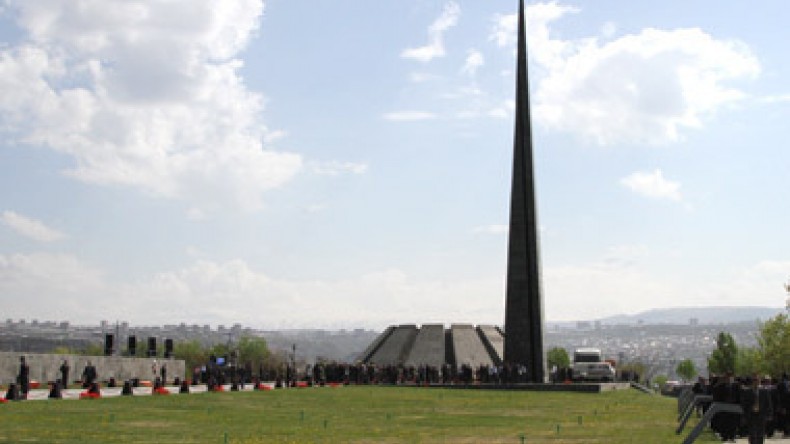
Turkey should be kept in the dark on Armenian Genocide centennial plans
It is no secret that Armenian communities around the world are busy planning scores of projects for the 100th anniversary of the Armenian Genocide on April 24, 2015.
It is also no secret that the Turkish government and its agents are closely monitoring all announced Armenian plans, so Ankara could prepare its counter-moves to the anticipated Armenian "Tsunami."
By publicizing their plans more than two years before the centennial, Armenians would be providing Turkish denialists valuable intelligence and sufficient lead-time to figure out how best to disrupt Armenian commemorative activities.
Armenians must realize that succeeding Turkish governments have had a long history of genocide denial. In fact, the crime of genocide and its cover up were designed simultaneously almost a century ago by the Young Turk regime. Furthermore, As a powerful state, Turkey is eager and willing to use its considerable resources to counter Armenian political initiatives around the globe. Ankara routinely pressures, threatens, and even blackmails all individuals, organizations, and states that acknowledge the facts of the Armenian Genocide.
A small example of such ominous developments occurred recently when a production team announced plans to make a major movie on the Armenian Genocide, based on Micheline Aharonian Marcom’s novel, "Three Apples Fell from Heaven." Sona Tatoyan, the film’s producer, gave an interview to a Turkish newspaper while visiting Istanbul last month, probably unaware that the Turkish media is notorious for distorting Armenian Genocide related topics. Ms. Tatoyan was fortunate that she was interviewed by Radikal, one of Turkey’s more reputable newspapers, known for its liberal views on the Armenian Genocide. Even then, there were some minor distortions in Radikal’s report. What made matters worse was the translation of the Tatoyan interview into English by a little known website called Al-Monitor, seriously distorting her views.
For example, Ms. Tatoyan’s statement to Radikal, that the bones of genocide victims were protruding from the sands of the Syrian desert in Der Zor and Ras al-Ayn, was misrepresented by Al-Monitor as: "We were crushing skulls and tossing bones." Worse yet, Al-Monitor falsely quoted Ms. Tatoyan stating: "They [Armenians] should forget the genocide." In reality, she had said: "Making peace with Anatolia, with Turks, does not mean forgetting the genocide or condoning the politics of denial in Turkey."
Ms. Tatoyan was naturally upset by the distortions of her deeply held convictions on the Armenian Genocide. In a subsequent interview with Asbarez newspaper, she categorically denied having ever told Armenians to forget the genocide. "I have not made such a statement. How could I have? How could I have said anything like that in an interview about a film on the Armenian Genocide I am helping create?"
Since Al-Monitor’s article was in English, most non-Turkish speakers read the distorted version of Ms. Tatoyan’s interview, which was widely disseminated on the internet. Many readers were terribly disappointed by what they thought were her views on the Armenian Genocide. This is a serious blow to her efforts because making a major movie is a costly undertaking that requires a huge investment. When potential financial supporters are turned off, it could have a devastating impact on the future of her project.
However, Ms. Tatoyan remains deeply committed to her film. She realizes that "during the production of the film, there will be constant attempts to distract us, to take our attention away from our goal of producing a great historical epic film on the Armenian Genocide. The best way to counter such attempts is to stay focused on the film and produce it for the world to see. The film speaks for itself," she told Asbarez.
It is unclear if the distortions of Ms. Tatoyan’s interview resulted from poor translation or intentionally done to undermine a major movie on the Armenian Genocide. Nevertheless, between now and April 24, 2015, Armenians could encounter a multitude of sinister Turkish schemes to quash Armenian initiatives aiming to demand justice from Turkey.
Armenians should be alert and circumspect in publicizing their plans for the 100th anniversary of the Armenian Genocide. Very few details should be disclosed to the public during the planning stages of special events and projects. The Turkish government should be prevented from learning about planned Armenian activities as much as possible in order to deny Ankara advance knowledge and time to counter and undermine Armenian righteous demands on the centennial of one of the 20th century’s most heinous crimes against humanity!
Harut Sassounian
Publisher, The California Courier
Newsfeed
Videos






























